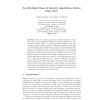331 search results - page 15 / 67 » Initial Population for Genetic Algorithms: A Metric Approach |
GECCO
2004
Springer
14 years 2 months ago
2004
Springer
In this study, a new mechanism that adapts the mutation rate for each locus on the chromosomes, based on feedback obtained from the current population is proposed. Through tests us...
GECCO
2003
Springer
14 years 1 months ago
2003
Springer
Abstract. There are conflicting reports over whether multiple independent runs of genetic algorithms (GAs) with small populations can reach solutions of higher quality or can fin...
GECCO
2010
Springer
14 years 1 months ago
2010
Springer
Crowding is a technique used in genetic algorithms to preserve diversity in the population and to prevent premature convergence to local optima. It consists of pairing each offsp...
GECCO
2000
Springer
14 years 7 days ago
2000
Springer
This paper introduces a new collective learning genetic algorithm (CLGA) which employs individual learning to do intelligent recombination based on a cooperative exchange of knowl...
FOGA
1998
13 years 10 months ago
1998
Genetic algorithms (GAs) are multi-dimensional and stochastic search methods, involving complex interactions among their parameters. For last two decades, researchers have been tr...

